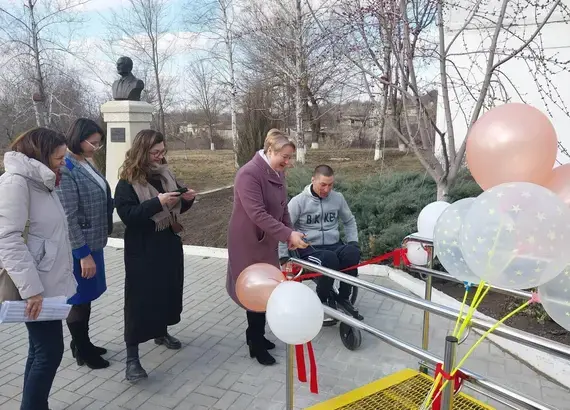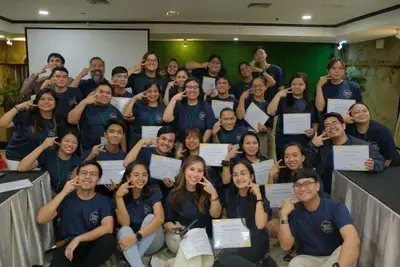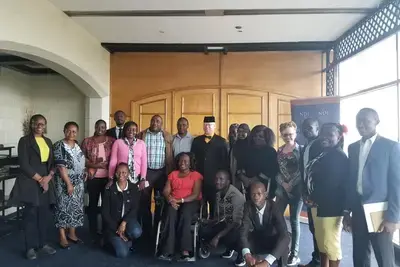
A CDPD program participant with a physical disability and other CDPD members celebrate the installation of a ramp at their local polling station in Singerei city. The ramp was installed as a result of CDPD’s advocacy efforts to ensure accessibility for voters with different types of disabilities.
Success Story
Partner Profile: Center for the Rights of Persons with Disabilities (CDPD)
In recognition of the International Day of People with Disabilities, NDI is highlighting the essential work of partners who are at the forefront of fighting for greater levels of equality and organizing to shift social norms and perceptions and reduce barriers to political participation for persons with disabilities.
NDI interviewed the Center for the Rights of Persons with Disabilities (CDPD), a partner organization that works with civil society and government stakeholders to improve accessibility to ensure people with disabilities in Moldova can exercise their rights to participate in political and public life on an equal basis as others. CDPD told us how they are working with government stakeholders to ensure public buildings and spaces, including polling stations, are accessible to people with different types of disabilities.
What does inclusion in civic and political life mean to you/your organization?
For us, social inclusion is a set of multidimensional measures and actions across multiple fields – including social protection, employment, housing, education, sports, health protection, information and communication, mobility, security, justice and culture – aimed at integrating people with disabilities into society.
What motivates you to be an active and engaged citizen?
In Moldova, people with disabilities are often not informed about their rights, legislation that impacts their lives, and the decision-makers they could turn to in order to solve a problem. People with disabilities in Moldova often experience societal discrimination, and even their family members may make incorrect assumptions about their abilities.
Over the years, CDPD has contributed to increasing the capacity of people with disabilities in the fields of participation in political and public life, self-representation, employment, and advocacy. We have found countless times that people with disabilities have the skills and desire to be politically active and engaged but often do not know the ways to get involved. This motivated us to implement projects to support people with disabilities in becoming community leaders, advocating for the promotion and respect of the rights of people with disabilities. So far, CDPD has supported over 20 local leaders with disabilities to promote equality and non-discrimination in their localities.
We have also found that state authorities are often not informed about the needs of people with disabilities, although they are open to taking concrete measures to implement legislation related to the rights of people with disabilities. This has motivated us to sensitize state authorities about disability inclusion. CDPD has developed many studies highlighting the needs and priorities of people with disabilities, as well as how to improve the quality of life for people with disabilities and create conditions to enable their active engagement in community life.
Describe some of the ways that people with disabilities in your country are participating politically. What challenges or barriers to political participation remain?
One way in which people with disabilities in Moldova participate politically is by exercising their right to vote. In recent years, Moldova has made progress in improving the accessibility of polling stations. The voting rate of people with disabilities remains low, however, because not all polling stations are accessible and equipped with the necessary equipment to support people with different types of disabilities in exercising their right to vote independently and secretly. An entrance ramp and a polling station located on the first floor facilitates voting for persons with physical disabilities, including wheelchair users or people with reduced mobility. Sign language interpretation at polling stations helps to ensure voting is accessible for persons with auditory disabilities, whereas lighting equipment and magnifying glasses help to ensure people with low vision can exercise their right to vote.
People with disabilities in Moldova are not sufficiently informed about their right to participate in political and public life, nor are they aware of the principles of public governance that must be respected by national and local public authorities. For instance, many people with disabilities are not familiar with the mechanisms to participate in political and public budgetary life, and access to information is very low. State authorities also do not respect the principle of governance and transparency around decision-making. These factors combine to limit the political participation of people with disabilities in Moldova.
The largest barrier to participation in political and public life is inaccessible public buildings and spaces. High curbs, the lack of traffic lights equipped with sound and tactile pavement, entrances without access ramps, and the lack of elevators and accessible bathrooms are some examples of common features that make buildings inaccessible. The existence of these barriers demonstrates that the right to accessibility for people with disabilities provided in the UN Convention on the Rights of Persons with Disabilities (CRPD) is violated.
Another barrier that limits the right of people with disabilities to participate in decision-making processes is that representatives of local and national public authorities are not familiar with accessibility standards, including the universal design principle. This results in situations in which money is wasted on inaccessible infrastructure, such as the installation of inaccessible ramps or the construction of sidewalks with high curbs.
CDPD has repeatedly noted that people with disabilities who are directly involved in public participation and good governance projects implemented by civil society in Moldova have a higher degree of involvement in political life. They participate in trainings, leadership programs, and awareness-raising activities regarding the respect of the rights of people with disabilities through dialogue, collaboration, and consensus-building.
How is your organization working to address these barriers/challenges and to eliminate discrimination against people with disabilities in your country?
CDPD, in partnership with the Central Electoral Commission and other disabled persons organizations (DPOs), has organized many advocacy campaigns to uphold the right to vote for people with disabilities. CDPD has evaluated polling stations to determine their compliance with accessibility standards. People with disabilities from several different geographic regions were directly involved in these projects, and they had the opportunity to engage in direct dialogue with local and national authorities.
CDPD also organized simulation activities to train poll workers on how a polling station should be set up to ensure accessibility for people with different types of disabilities. As a result, the polling stations were set up on the first floor of buildings with accessible entrances and equipped with assistive devices, such as magnifying glasses, lamps, and tactile envelopes, to support people with visual disabilities and other disabilities in exercising their right to vote. In Singerei City, a wheelchair user who participated in CDPD’s project successfully advocated with local authorities for the provision of a mobile ramp at his local polling station.
Through participation in town halls, CDPD works to promote accessibility standards in order to remove barriers and foster the participation of persons with disabilities in political and public life. We encourage people with disabilities to use their collective voice to regularly notify the authorities of the issues that matter most to them and, at the same time, to come up with recommendations or proposals to solve these issues. In this way, the authorities are also more open to collaboration. Participation in public meetings is also an important way for people with disabilities to be informed about public decision-making, which may impact their lives.
CDPD also supports people with disabilities to organize initiative groups at the local level or join DPOs in order to amplify their impact and advocate to representatives of local and central public authorities for issues that matter to them. CDPD helps to ensure people with disabilities are consulted during the development of public policies. CDPD supports people with disabilities by auditing the accessibility of buildings and public spaces, engaging in direct dialogue with government stakeholders to address these issues, working on action plans, and participating in public consultations.
In the past year, can you briefly share a success from your organization’s contribution to strengthening the disabled persons movement?
In Causeni, Vasile Savca, a local leader with a disability who was involved in CDPD’s political participation project, has since collaborated very actively with local public authorities to create accessibility conditions at the local level. After almost 5 years of activism – including regular participation in town halls and rational council meetings – he successfully pushed the authorities to create conditions of accessibility in the city. Due to his contribution, a transport route accessible to people with disabilities was launched in Causeni district, which is the first locality in Moldova to have an adapted public transport system. The adapted public transport system benefits people with disabilities from the municipality of Chisinau, the regions of the suburbs of Chisinau, and the municipality of Bălti. The District Council building was also updated to ensure equal access for people with different types of disabilities. Updates included the installation of an elevator, accessible parking spaces, and street intersections equipped with tactile pavement and lower curbs.
What impact has NDI’s partnership had on your organization?
During our partnership with NDI, we have supported people with disabilities in becoming active leaders and participating in decision-making processes and local government policies to improve the accessibility of public spaces. CDPD’s initiative groups are composed of people with disabilities and support representatives of local public administrations (LPA) to implement accessibility standards. Initiative groups have already begun approaching these authorities with concrete solutions to accessibility issues. The Council on social inclusion at City Hall, which was recently established, maintains an ongoing dialogue with LPAs for policy approval in favor of people with disabilities. These efforts help to push the authorities to implement legislation on respect for the rights of persons with disabilities in Moldova.
Additionally, one of our members, Svetlana Arhiri, a woman with a visual disability, successfully advocated for the creation of an accessibility commission within the Social Assistance Directorate of Ungheni and was subsequently appointed to serve on this commission.
During this partnership, CDPD also collaborated with government authorities to assist in the development of the National Social Inclusion Program 2024-2028.
CDPD was also successful in calling for the inclusion of training on accessibility standards in the curriculum for certified architects at the Institute of Scientific Research in Constructions. In November 2023, the local promoters involved in the project presented accessibility reports to representatives of the mayor's office. These reports lay the groundwork for the creation of Inclusion Councils and the elaboration of Accessibility Action Plans 2024-2027.


